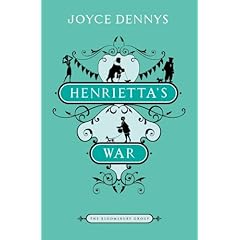
I could happily while away the time reading humorous books that make light of terrible experiences - and quite a few of these were written by women during World War II. If you can make a joke, you can survive: that is the premise behind much humor. Monica Dickens’s One Pair of Feet is a vivid, droll memoir of her experiences training to be a nurse during World War II - and, yes, Monica is the great-granddaughter of Charles. Many of Angela Thirkell’s nonsensical, witty Barsetshire novels are set during World War II (and her peculiar humor is simply unequalled). Always on the lookout for light, cheerful humor books, I have just discovered Joyce Dennys's Henrietta's War: News from the Home Front 1939-1942 - one of the most charming of these WWII books.

Joyce Dennys, an illustrator and writer, was fortyish when she began to write Henrietta's War - a hilarious series of epistles about life on the home front during World War II, originally published in a magazine called the Sketch - and illustrated with her stylized cartoonish drawings. Written from “Henrietta” (Joyce) to an imaginary friend at the front, Robert, her witty letters capture the bewilderment, humor, tension, irony, sadness, terror over bombs, and mirth over bureaucratic trends like housewives being told to stock one’s cupboards for emergency one week and accused by the government of “hoarding” food the next.
Four of the characters are real: the bubbly Henrietta/Joyce herself; her husband, Charles, a doctor; Linnett, her daughter; and Perry, the bad-tempered dog. Henrietta, who is fragile and susceptible to colds and exhaustion, manages to spice up women's war efforts with casual humor: she describes a frantic jumble sale to raise money for flannel for hot water bottles after the zealous Sewing B exhausts supplies; a policeman drags Henrietta into court when a light shows during the blackout; and she attends a marmalade party at which there is not enough sugar.

"Perfect Wife": an example of Dennys's art from the '30s
Henrietta's friends are also witty. Faye, a beauty, is self-centered but fun. She is horrified when clothing rations are cut, can't believe makeup is scarce, and commandeers her moony beau, the Conductor (of music), into escorting her and conducting concerts. Lady B is always charming - she cheers up Henrietta when she gets depressed, takes in evacuees and a microscopic dog from a friend (she had been expecting a spaniel), and insists that Christmas should be merry because they can't help fight the war anyway.
Some characters are annoying, but none are all bad. The Whinebites, an arty couple who are self-righteous about vegetarianism, preen when meat becomes scarce. Yet they’re patriots who give a rousing War Weapons Week party, at which everyone pays half a crown and brown-bags it - but also brings a “war anachronism,” like old chocolates, restaurant menus (which they hungrily read), and a cookbook that requires you to “Take the yolks of eight eggs and a pint of cream.” Mrs. Savernack is a terror who wields a gun everywhere she goes, shooting game and looking for Germans, until it is confiscated from her - but she sacrifices her own meat to feed her dogs and finds meat for Henrietta’s dog, Perry.
Victory gardens are not exactly fun. After Henrietta hurts her back digging, she straps a hot water bottle onto her back while gardening.
“Digging for freedom is not nearly as romantic as it sounds. Ever since the war, Charles and I have been worrying about a patch of No-Man’s-Land at the bottom of our garden. Every time we looked at it, we felt we were betraying the empire.”
Henrietta wears a grim “shopping face” as the war continues and meat and fish become scarce. She catches sight of her reflection in a window and hardly believes that she looks so worn and hard. Then she notices all the other women have the same expression. Only Lady B looks calm: she explains to Henrietta that she looks at the sea and is happy to see one thing has more than enough of what is needed.
Summer tourists arrive every year and rudely tell the villagers that they don’t know there’s a war on.
“Charles and I, every summer, even go so far as to play a game called ‘Insults.’ It is a simple pastime which amuses us and does the Visitors no harm. Every time we are insulted by a Visitor, separately insulted, I mean, we score a point. Charles always wins; partly because he meets so many more people than I do, and partly because his profession exposes him to insults of the juiciest variety.”
I simply loved it and am giving it to everyone for Christmas. It has been reissued by Bloomsbury UK (though it will not be published by Bloomsbury in the U.S. until next year) and new and used copies of the Bloomsbury edition and old Penguins are available online.
No comments:
Post a Comment